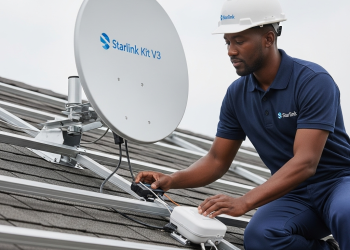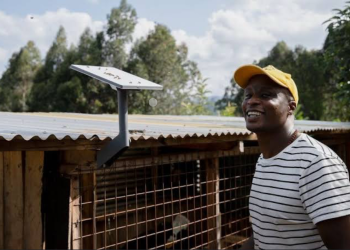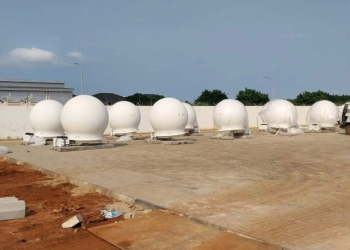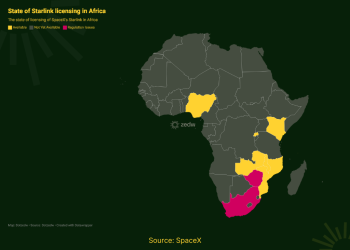Introduction
Starlink, Elon Musk’s revolutionary satellite-based internet service, has transformed internet accessibility in remote and underserved areas around the globe. But in parts of Africa, Starlink’s popularity has led to an unexpected hurdle: it’s “sold out” in major cities. With a surge in demand, urban areas like Harare, Lusaka, Nairobi, Abuja, Lagos, Port Harcourt, and Accra have seen new residential subscriptions completely paused. This capacity issue prompted Musk to reassure users that Starlink is actively working on solutions to expand its network and meet the region’s high demand.
What Is Starlink?
Brief Description of Starlink Technology
Starlink, developed by SpaceX, is a high-speed, satellite-based internet service intended to provide internet access to areas lacking reliable broadband infrastructure. By deploying low-Earth orbit satellites, Starlink aims to create a global web of coverage that reaches rural and underserved regions.
How Starlink Provides Internet Coverage
Traditional internet relies on extensive land-based infrastructure, which can be costly to implement in rural areas. Starlink bypasses this need by using satellites positioned closer to Earth than traditional ones, significantly reducing latency and offering better speeds. Users simply need a Starlink kit, which includes a satellite dish and router, to connect.
Advantages Over Traditional Internet
Unlike traditional providers, Starlink’s satellite network eliminates the need for costly infrastructure investments, making it an ideal solution for regions where laying cables or building towers is impractical. Starlink’s setup is easy and portable, allowing users in even the most remote areas to access reliable, fast internet.
Starlink’s Popularity in Africa
Why Starlink Is in High Demand in Africa
Africa, with its vast landscapes and limited internet infrastructure, has become one of Starlink’s largest potential markets. In many areas, reliable internet is scarce, and where available, it’s often expensive and slow. Starlink provides an alternative that allows African users to experience fast, reliable internet, often for the first time.
Limited Internet Infrastructure in Many Regions
Many African regions still lack the infrastructure needed to support stable, high-speed internet, especially in rural or remote areas. Traditional providers struggle to serve these areas due to the costs involved in extending network infrastructure. Starlink’s satellite system circumvents these issues by delivering internet directly via satellite.
Affordability and Accessibility of Starlink
For many in Africa, Starlink’s pricing is more competitive than local options, especially given the higher speeds and reliability it offers. As a one-time investment, the setup kit is relatively affordable, making Starlink attractive in areas where traditional broadband options are both expensive and limited in reach.
The “Starlink Sold Out” Issue in Africa
Understanding the “Sold Out” Status
Recently, Starlink’s availability has been completely paused for new residential subscriptions in specific cities across Africa, including Harare, Lusaka, Nairobi, Abuja, Lagos, Port Harcourt, and Accra. Previously listed as “Expanding in 2025,” these locations now display “Sold Out,” causing concern among residents who missed the opportunity to subscribe. For these cities, the “sold out” label indicates that all residential slots have been filled.
Rising Demand Exceeding Current Capacity
The overwhelming demand for Starlink, particularly in urban centers, has quickly surpassed its current satellite and network capacity. This demand is a testament to the need for reliable internet in Africa’s growing urban population. According to Musk, SpaceX is aware of the issue and working to increase capacity.
Impact on New Residential Subscribers
For now, Starlink has halted new Residential subscriptions in these “sold out” areas, meaning only those who already have accounts or new Business subscribers have access. Businesses still interested can subscribe, but only through local authorized resellers, who often charge higher rates than Starlink’s standard pricing.
Elon Musk’s Response to Capacity Constraints
Public Acknowledgment of Starlink’s Sold-Out Status
Elon Musk has publicly addressed the sold-out issue, promising that SpaceX is actively working on expanding capacity to accommodate the high demand in Africa. He has acknowledged the gap and reassured users that steps are underway to scale operations to meet this demand.
Plans for Expanding Starlink Capacity
To address these constraints, Musk outlined SpaceX’s plans to add more satellites and upgrade the infrastructure necessary to handle higher demand. This will allow Starlink to onboard more customers without sacrificing service quality.
Why Starlink Is Facing Capacity Challenges in Africa
Infrastructure and Logistics of Satellite Deployment
Building out Starlink’s satellite constellation isn’t as simple as launching more satellites. Each addition requires significant resources, logistical coordination, and time. Ground equipment and optimized network management are necessary to handle the increased load effectively.
High Demand Poses Operational Strain
Starlink’s rapid adoption has put strain on its resources, with the surge in urban demand pushing its current capacity to the limits. These capacity challenges have temporarily halted new Residential subscriptions in key cities.
Steps to Address Starlink’s Shortage in Africa
Increase in Satellite Launches
SpaceX is ramping up its satellite launches to increase Starlink’s network capacity. More satellites will improve coverage and enable the service to accommodate more users without compromising speed or reliability.
Upgrading Ground Equipment for Enhanced Service
To meet the needs of users, SpaceX is also focusing on upgrading its ground-based equipment. These upgrades will enable Starlink to handle more connections, increasing availability and reliability.
Impact of Starlink’s Shortage on African Consumers
Consumer Frustrations and Challenges
The capacity issues have left many African consumers frustrated, particularly those in the “sold out” cities who were unable to subscribe before slots filled up. This scarcity has created delays and, in some cases, higher costs due to reliance on local resellers for business packages.
Limited Access in Remote and Urban Areas
Without new Residential subscriptions, some urban consumers in sold-out cities are unable to access the service. Those who do get access face increased prices from local resellers due to Starlink’s limited availability.
Higher Prices Through Authorized Resellers
Only business packages are now available through authorized resellers, who charge above the standard rates found on Starlink’s website, making it harder for average consumers to afford the service.
Benefits of an Expanded Starlink Network in Africa
Economic Growth and Digital Transformation
With expanded Starlink capacity, African cities and rural areas can experience economic growth as businesses, schools, and healthcare services gain access to reliable internet. This connectivity could transform daily life, enabling faster communication, e-commerce, and educational access.
Educational and Healthcare Advantages
Internet access opens up a wealth of resources for schools and medical facilities in remote areas, offering access to digital tools, medical resources, and information that were previously out of reach.
Boost for Small Businesses and Entrepreneurs
Starlink’s expansion provides a huge opportunity for small businesses and entrepreneurs in Africa. Reliable internet enables them to access new markets, enhance productivity, and offer new services.
Challenges in Scaling Starlink Across Africa
Financial and Regulatory Hurdles
Scaling Starlink across Africa involves navigating complex regulatory environments and addressing financial constraints that vary from country to country.
High Costs of Satellite Technology
Deploying and maintaining satellites is costly, and the high expenses associated with this technology affect Starlink’s pricing and availability.
What Consumers Can Expect Next
Timeline for Increased Capacity
While Starlink hasn’t provided an exact timeline, Musk’s statements indicate that SpaceX is actively working on expanding capacity, with new satellites and upgrades expected to improve availability.
Potential Adjustments to Pricing and Accessibility
As the network expands, Starlink may adjust pricing, offering more affordable options as capacity increases.
Conclusion
Starlink has made internet access more accessible for many African cities, but surging demand has temporarily led to a “sold out” status. Elon Musk’s acknowledgment of this capacity issue, along with Starlink’s commitment to launching more satellites, shows a strong dedication to meeting Africa’s connectivity needs. With plans to expand, Starlink aims to provide more opportunities for Africans to connect and grow in the digital age.
FAQs
- How soon will Starlink increase its capacity in Africa?
Elon Musk has promised ongoing work to expand capacity, but specific timelines remain unclear. New satellites are expected to alleviate some of the shortages. - Why is Starlink so popular in African cities?
Starlink provides reliable, high-speed internet where traditional infrastructure is lacking, making it an appealing option for those in underserved areas. - Will Starlink prices rise with expanded service?
As capacity increases, pricing adjustments are possible, but no specific price changes have been announced. - How does Starlink compare with traditional internet services?
Starlink’s satellite technology offers faster speeds and lower latency in remote areas, making it a viable alternative to traditional services with limited reach. - Can other providers address Africa’s internet issues if Starlink cannot?
While other providers exist, Starlink’s unique satellite approach fills a critical gap in remote areas where traditional providers struggle to reach.














